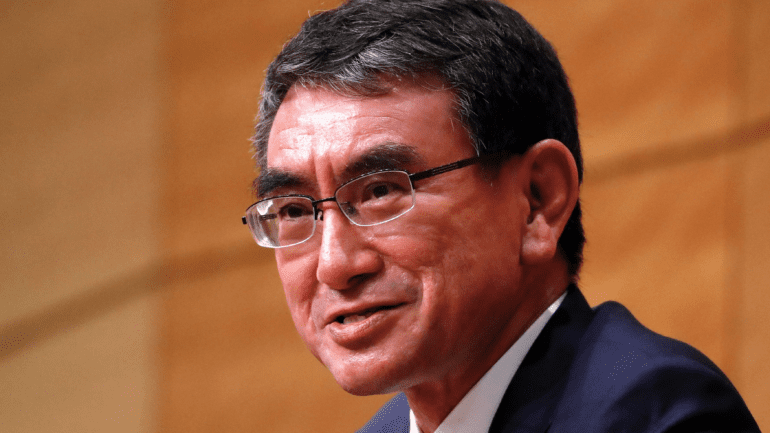TL;DR:
- ChatGPT misidentifying digital minister Taro Kono sparks calls for AI regulation.
- Kono advocates for AI to overcome labor shortages caused by population decline.
- Prime Minister Fumio Kishida formed a panel to assess the economic potential and risks of AI.
- Digital ministers from the Group of Seven agree on promoting “trustworthy AI.”
- European Union takes steps toward regulating AI tools like ChatGPT and Google’s Bard.
- Kono asserts that robots are not a threat to Japan’s labor force due to population decline.
- Japanese government discusses data set creation with Microsoft and other tech providers.
- SoftBank Group’s mobile unit joins the global race to develop AI similar to ChatGPT.
- Kono aims to eliminate outdated technologies and streamline government processes.
- My Number card issuance faces challenges, but Kono expects the program to resume after evaluations.
- Kono, despite losing the party leadership vote, remains popular in media polls for prime minister.
Main AI News:
A recent incident involving the misidentification of digital minister Taro Kono by ChatGPT has prompted a renewed call for stricter regulations surrounding artificial intelligence (AI) technology. Kono, a strong advocate for AI implementation to combat labor shortages caused by Japan’s declining population, expressed his concerns during an interview with Bloomberg Television. The incident occurred when Kono queried the AI model about himself, only to be referred to as the “prime minister of Japan” instead of his correct title. Kono emphasizes that his name should be written in the Japanese style, with the surname preceding the given name.
To address the growing importance of AI and its potential risks, Prime Minister Fumio Kishida has formed a panel dedicated to examining the economic implications and potential hazards of this transformative technology. As the current chair of the Group of Seven wealthy democracies, Kishida aims to lead the way in establishing regulatory frameworks for AI. In line with this objective, the group’s digital ministers reached a consensus last month on an action plan to promote “trustworthy AI.” Furthermore, the European Union has taken a significant step toward increased regulation of AI tools such as OpenAI’s ChatGPT and Google’s Bard.
Kono emphasizes that the use of robots in Japan is not a threat to the labor force due to the country’s shrinking population. On the contrary, he highlights the government’s enthusiasm for exploring new AI technologies. In fact, the Japanese government is currently in discussions with technology providers, including Microsoft, to facilitate the creation of comprehensive data sets. Kono acknowledges that compared to English, the availability of minority language data sets is limited, potentially leading to biased outcomes.
In response to the widespread interest in AI development, SoftBank Group’s mobile unit recently announced its participation in the global race to create an AI model similar to OpenAI’s ChatGPT. This move follows the footsteps of various American and Chinese companies that have already made significant strides in this domain.
Kono, who assumed his current position last year, has long been engaged in efforts to streamline government processes by eliminating outdated technologies like fax machines and floppy disks. His upcoming goal is to pass a bill, potentially within this month, that would remove unnecessary requirements from over 10,000 laws and regulations. Kono has been meticulously examining paperwork spanning several decades to identify and eliminate redundant provisions.
However, the government’s initiative to issue My Number cards, which simplify local government paperwork, recently encountered a setback. Mistakenly, cardholders received residence certificates intended for unrelated individuals, leading to privacy concerns. Kono remains confident that local governments will resume the program after thorough evaluations conducted by Fujitsu, the system’s developer.
Kono’s outspoken nature and his unwavering commitment to innovation have propelled him to the forefront of media attention. In various polls, he consistently emerges as a popular choice for the position of prime minister, despite losing to Kishida in the 2021 run-off vote for the leadership of the ruling Liberal Democratic Party.
Conlcusion:
The incident surrounding ChatGPT’s misidentification of digital minister Taro Kono and the subsequent call for AI regulation highlight the increasing importance of robust and accurate AI systems in the market. As AI technology becomes more prevalent, businesses need to ensure the reliability and trustworthiness of their AI tools.
Stricter regulations, as proposed by Prime Minister Fumio Kishida and the European Union, indicate a growing recognition of the need to address potential risks and promote responsible AI usage. For companies operating in the AI market, there is a heightened emphasis on developing AI models that can accurately identify individuals and provide reliable information.
Additionally, the interest and competition surrounding AI development, as seen with SoftBank’s entry into the race, underscore the market’s recognition of AI’s potential and the demand for advanced AI solutions. To thrive in this evolving landscape, businesses should prioritize transparency, accountability, and the development of AI systems that align with regulatory guidelines to maintain market trust and credibility.

